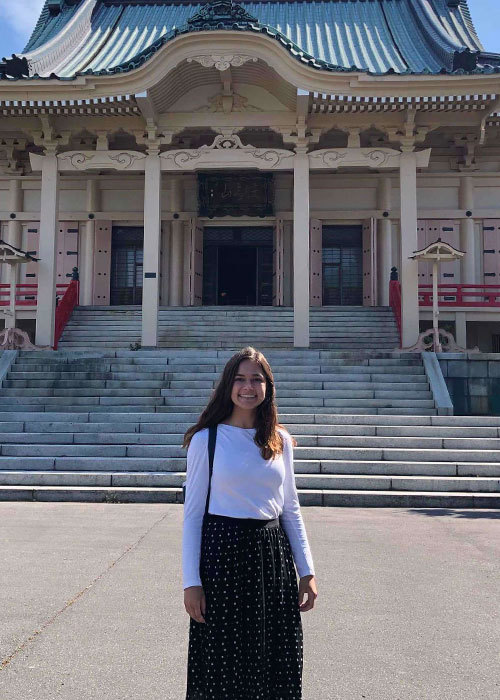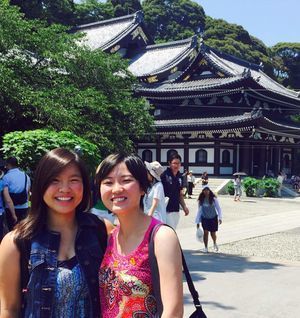
Francine Shaft '22 hails from Grand Forks, North Dakota. Grand Forks' sister city program with Kanuma, Japan opened her eyes to an interest in Japanese language and culture when she participated in a high school international exchange.
Now a junior Scott Scholar and part of the Glynn Family Honors Program at Notre Dame, Shaft is majoring in theology and Japanese with minors in history. She has had a multitude of language learning opportunities and international travel experiences through the Japanese program that she plans to use after graduation.
Why did you decide to major in Japanese at Notre Dame?
My high school didn’t offer Japanese language courses, but my town, Grand Forks, has a sister city with a town in Japan called Kanuma. Students from that town would live with host families or we’d send students to stay over there.
I always thought I would study Spanish, but when I went over to Kanuma as part of that exchange, it was my first real exposure to what day-to-day Japanese culture was like. I had a really wonderful host family there, I had always been interested in the culture, and I knew I wanted to master a language in college. I thought I might as well take the leap and try a language that I had never studied before. It was my only opportunity to receive the sort of instruction I was looking for in Japanese.
What was your first year of language study like without any background in the language?
Most students studying Japanese here have not had previous instruction in the language. The first year was really challenging but really worth it, and I think my classmates would say the same. Like many intensive language courses at ND, it’s five credits, so you take the class every day. We learned the first writing system in two weeks, and learned the second in another two weeks, and then we started Kanji [Chinese characters], which is a never-ending learning process.
The instructors realize that it’s challenging, and they really want to foster community within the Japanese program. I would look forward to going to class and learning about my classmates in the language.
What opportunities exist outside the classroom for Japanese language students at Notre Dame?
There are four different semester study abroad programs in Japan. A lot of students go on them even if they’re not studying Japanese. The most common for Japanese students is Nagoya, where they offer intensive language and culture courses, on subjects like tea ceremony, traditional Japanese dance, calligraphy, and more. You have the option to have a true college experience in the dorms or to stay with a host family to work on language skills.
There is also one in Kyoto and two in Tokyo, which are more common for students studying business. I was supposed to be in Nagoya this past fall but all study abroad was canceled.
The Japanese program itself sends a lot of students abroad in the summer through independent programs that they support. During the summer after my freshman year, I went with four other Notre Dame students to Hokkaido, Japan for two months, along with students from other universities. I lived with a host family and had lots of cultural and travel opportunities.
It’s cool that the professors in Japanese really care about their students’ language abilities and seek out these summer programs.
What are some of your favorite courses through the Japanese program?
Everyone follows a similar track, but there are two classes that you can take almost every semester that stand out. Tadoku, or Japanese reading, is a cutting-edge class. Starting after the first semester of Japanese, you can take it for one or two credits. Students go to the library and read Japanese children’s books, and as you progress, you can read more difficult material, but a lot of people choose to read easy books. It’s all about learning to understand Japanese based on pictures and context, but also about finding enjoyment in reading Japanese. It might not even challenge you, but your reading speed increases, your ability to recognize characters increases, and you do a creative final project. For instance, I’ve written a folk tale, poems with friends, and a story about my childhood in the three times I’ve taken the class.
You can also take Japanese listening after your second year. This class was started by students, so goes to show how people in the department really care about language learning. Each week, a different student presents on a topic related to Japanese culture. It’s a great opportunity to put Japanese skills to use, or to maintain skills and stay in touch with your friends.
Why would you recommend the Japanese language program to incoming students?
There are three reasons I would recommend the Japanese program. The first one is the community, which is so important in language learning because when you’re learning, you’re speaking with the other students and learning about them. You’ll end up becoming friends with everyone in the department and you’ll get motivated to stick with it. The people I went to Japan with that summer after freshman year became some of my closest friends.
The second is that the Japanese program really pushes you to go over and get first-hand experience, and that there are lots of opportunities to use the language after graduation. It’s wise for business students to take, and for people who are interested in the culture, and there are opportunities for anyone in the language.
The third is that it’s such a fascinating language and will challenge you in ways other languages might not. I think differently because I’m learning a language so different from my own. Although it looks daunting, you move at such a quick pace with so much support, any sort of barrier quickly dissipates, and it suddenly becomes so familiar so quickly.
What do you hope to do with your Japanese major after graduation?
I want to teach English in Japan for one or two years, and then return to the states and teach theology or history. I definitely want to keep Japanese infused in my life. I don’t want to lose my skills, and I want to keep learning. I would also love to facilitate more opportunities for students to travel to Japan, like the one I had in high school, as it was such an eye opening experience.

Learn More
- Explore the Japanese major, supplementary major, and minor at Notre Dame.
- See what Japanese majors do after graduation.
- Check out opportunities that take undergraduates beyond the classroom.